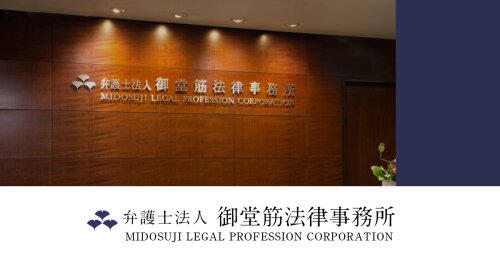Best Corporate & Commercial Lawyers in Japan
Share your needs with us, get contacted by law firms.
Free. Takes 2 min.
Or refine your search by selecting a city:
List of the best lawyers in Japan
About Corporate & Commercial Law in Japan
Corporate and commercial law in Japan encompasses the rules and regulations that govern how businesses are established, operated, and dissolved, as well as how commercial transactions are conducted. These laws set out the legal framework for companies, partnerships, and other business entities, and also cover issues such as mergers and acquisitions, contracts, competition, intellectual property, and dispute resolution. Japan's legal landscape has evolved to accommodate both domestic enterprises and foreign investors, with an emphasis on transparency, governance, and compliance.
Why You May Need a Lawyer
Navigating the complexities of corporate and commercial law in Japan often requires specialist guidance. Here are some common situations where legal assistance is crucial:
- Incorporating a new company or registering a foreign business in Japan
- Drafting, reviewing, or negotiating commercial contracts and agreements
- Engaging in mergers, acquisitions, joint ventures, or restructuring
- Ensuring compliance with Japanese laws and regulations, such as anti-monopoly rules or data protection laws
- Resolving business disputes through litigation, arbitration, or alternative dispute resolution
- Handling intellectual property registration and protection
- Dissolving or liquidating a company
- Managing employment law issues and internal regulations
A qualified lawyer can help navigate these processes, reducing risk and ensuring your business interests are protected.
Local Laws Overview
Japan’s corporate and commercial legal environment is shaped by several core statutes and regulations. Key elements include:
- Companies Act: Outlines company formation, governance, shareholders’ rights, director duties, and disclosure requirements.
- Commercial Code: Governs commercial transactions, contracts, and broader business conduct.
- Foreign Exchange and Foreign Trade Act: Regulates foreign investment and cross-border business activities.
- Antimonopoly Act: Ensures fair competition and prohibits monopolistic or unfair trading practices.
- Intellectual Property Laws: Provide protection for patents, trademarks, and copyrights essential to commercial dealings.
Japanese corporate law places considerable importance on transparency, shareholder protection, compliance, and regular reporting. Foreign companies must register and comply with relevant rules, including requirements for local offices or representatives in some cases. In addition, regulations regarding consumer protection, data security, and environmental compliance may impact certain industries.
Frequently Asked Questions
What types of business entities can be established in Japan?
The most common forms are Kabushiki Kaisha (KK - joint-stock company) and Godo Kaisha (GK - limited liability company), but there are also partnerships and branches of foreign companies.
Can a foreigner or foreign company own a business in Japan?
Yes, foreign individuals and entities can own and operate businesses in Japan, although procedures and certain restrictions apply in regulated industries.
How long does it take to set up a company in Japan?
The process usually takes two to four weeks, depending on the company type and completeness of required documentation.
What are the annual compliance requirements for Japanese companies?
Companies must file annual financial statements, hold shareholders’ meetings, pay corporate tax, and update company registries.
Are contracts in English legally binding in Japan?
Yes, contracts in English can be binding, but official disputes may require Japanese translations in court or before authorities.
What are directors’ legal responsibilities in Japanese companies?
Directors must act in the company’s best interests, comply with laws, and ensure accurate reporting and management. Breaches may result in personal liability.
Do employment laws apply to all businesses in Japan?
Yes, labor laws including work hours, wage regulations, and dismissal procedures apply to all businesses operating in Japan.
How are business disputes typically resolved?
Disputes may be handled by negotiation, mediation, arbitration, or litigation in Japanese courts. Arbitration is often preferred for international issues.
Is it mandatory to have a local director or representative?
Certain company types, like Kabushiki Kaisha and branches of foreign companies, must appoint at least one resident representative.
What is the minimum capital required to start a company?
Theoretically, a company can be established with capital as low as one yen, but a practical amount is recommended for smooth operation and credibility.
Additional Resources
Individuals and businesses seeking further information or legal assistance in Japan may consult the following resources:
- Ministry of Justice - provides guidelines on company registration and legal compliance
- Japan External Trade Organization (JETRO) - offers support for foreign businesses entering Japan
- Japan Fair Trade Commission - regulates competition and enforces the Antimonopoly Act
- Local Bar Associations and Lawyer Referral Services
- Chambers of Commerce such as the Japan Chamber of Commerce and Industry
Next Steps
If you require legal help regarding corporate and commercial matters in Japan, consider the following actions:
- Gather relevant documents and information about your business or query
- Consult with a qualified Japanese lawyer or law firm specializing in corporate and commercial matters
- When contacting a lawyer, clearly outline your goals and concerns to facilitate effective advice
- Take note of critical deadlines, especially for company registration, tax filings, or dispute responses
- Consider language needs and request services in English if necessary
Engaging professional legal support can help you avoid costly errors and ensure your business operates smoothly within the Japanese legal framework.
Lawzana helps you find the best lawyers and law firms in Japan through a curated and pre-screened list of qualified legal professionals. Our platform offers rankings and detailed profiles of attorneys and law firms, allowing you to compare based on practice areas, including Corporate & Commercial, experience, and client feedback.
Each profile includes a description of the firm's areas of practice, client reviews, team members and partners, year of establishment, spoken languages, office locations, contact information, social media presence, and any published articles or resources. Most firms on our platform speak English and are experienced in both local and international legal matters.
Get a quote from top-rated law firms in Japan — quickly, securely, and without unnecessary hassle.
Disclaimer:
The information provided on this page is for general informational purposes only and does not constitute legal advice. While we strive to ensure the accuracy and relevance of the content, legal information may change over time, and interpretations of the law can vary. You should always consult with a qualified legal professional for advice specific to your situation.
We disclaim all liability for actions taken or not taken based on the content of this page. If you believe any information is incorrect or outdated, please contact us, and we will review and update it where appropriate.
Browse corporate & commercial law firms by service in Japan
Japan Attorneys in related practice areas.
Browse corporate & commercial law firms by city in Japan
Refine your search by selecting a city.













